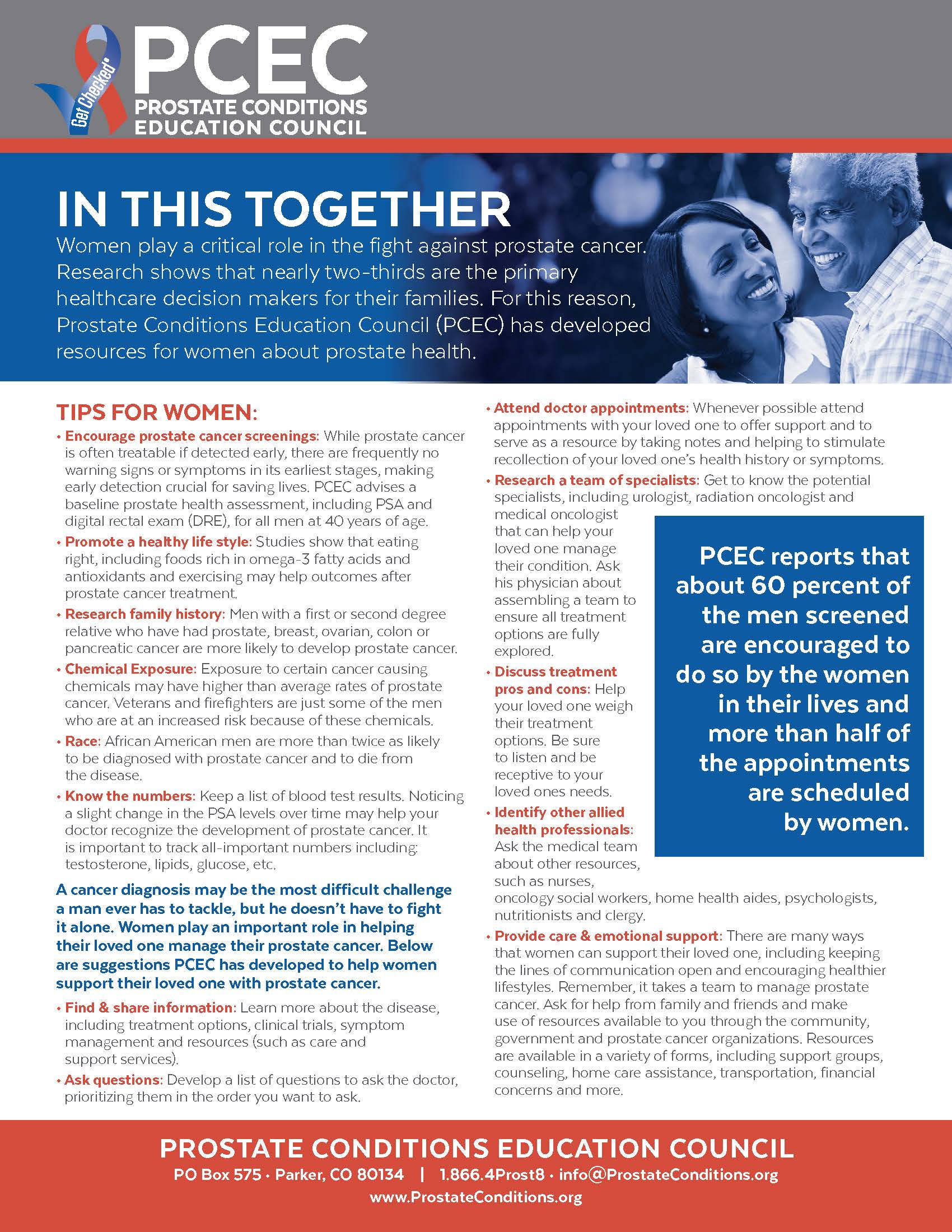Women play such a large role in keeping the men in their life healthy, so it is greatly important that they are educated as well about prostate cancer! In This Together is a program that provides a valuable network and resources for women who are helping the men in their lives stay healthy.
In This Together:
Women make nearly two-thirds of the healthcare decisions in this country.
PCEC reports that about 60% of the men screened for prostate cancer and other health conditions are encouraged to do so by the women in their lives and more than 1/2 the appointments are scheduled by women!
Women play such a large role in keeping the men in their life healthy, so it is greatly important that they are educated as well about prostate cancer! In This Together is a program that provides a valuable network and resources for women who are helping the men in their lives stay healthy.
Tips For Women
Encourage prostate cancer screenings: While prostate cancer is often treatable if detected early, there are frequently no warning signs or symptoms in its earliest stages - making early detection crucial for saving lives. PCEC advises a baseline prostate health assessment, including PSA and digital rectal exam (DRE), for all men at 35 years of age. Based on this initial assessment, PCEC recommends:
- Men with a PSA less than 1.5ng/ml be screened again in 5 years.
- Men with a PSA greater than 1.5ng/ml be screened every year.
- At risk men; African-American men, men with a family history of prostate or breast cancer, BRCA gene, men who have been exposed to certain chemicals known to cause cancer or men over the age of 65 years shoudl be screened each year.
- PCEC does not advocate for screenings if a man's life expectancy is less than 10 years.
Promote a healthy lifestyle: Studies show that eating right, including foods rich in omega-3 fatty acids and antioxidants as well as exercising may help reduce the risk of prostate cancer.
Research Family History: Men with a father or brother with prostate cancer have a higher risk of developing the disease. Men also with the inherited mutations of the BRCA1 or BRCA2 genes raise the risk of breast, ovarian and prostate cancer in some families.
Occupation: Recent studies show that firefighters are at a 28% greater risk to develop prostate cancer compared to the general population. Exposure to certain chemicals such as pesticides and herbicides may have higher than average rates of prostate cancer. Veterans who were exposed to the defoliate Agent Orange are 49% more likely than non-exposed veterans to be diagnosed with prostate cancer.
Know the Numbers: Keep a list of blood test results. Noticing a slight change in the PSA levels over time may help your doctor recognize the development of prostate cancer.
Be Educated: Take some time to learn about prostate cancer, common risk factors and its signs and symptoms. If detected early, prostate cancer is nearly 100% survivable.
A cancer diagnosis may be the most difficult challenge a man ever has to tackle, but he doesn't have to fight it alone. Women also play an important role in helping their loved ones mange their prostate cancer. If you are a woman who is seeking information, tips or guidance about how to support your loved one with prostate cancer please do not hesitate to contact PCEC anytime at 303-316-4685 or This email address is being protected from spambots. You need JavaScript enabled to view it..

